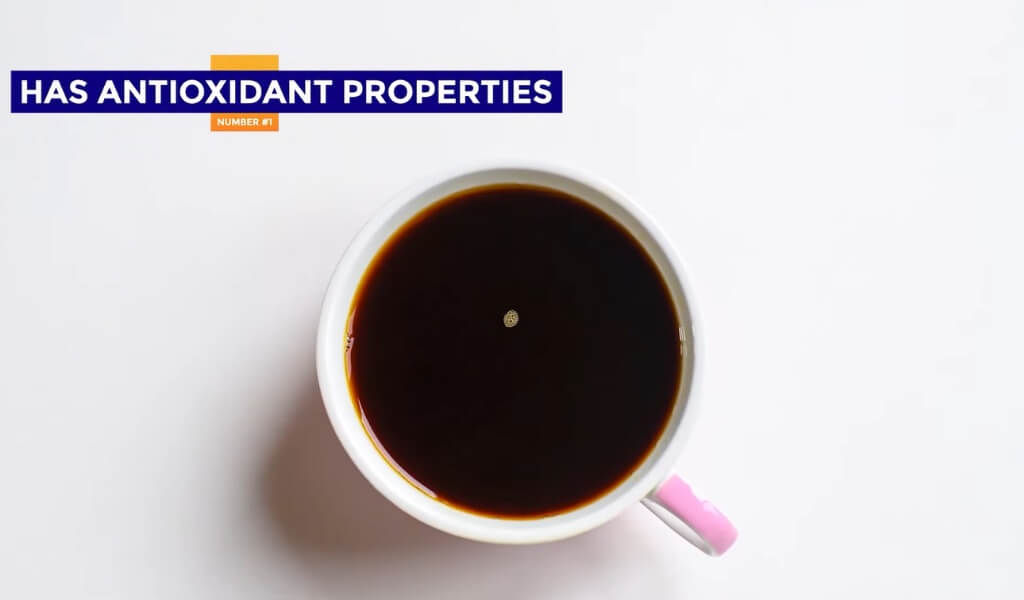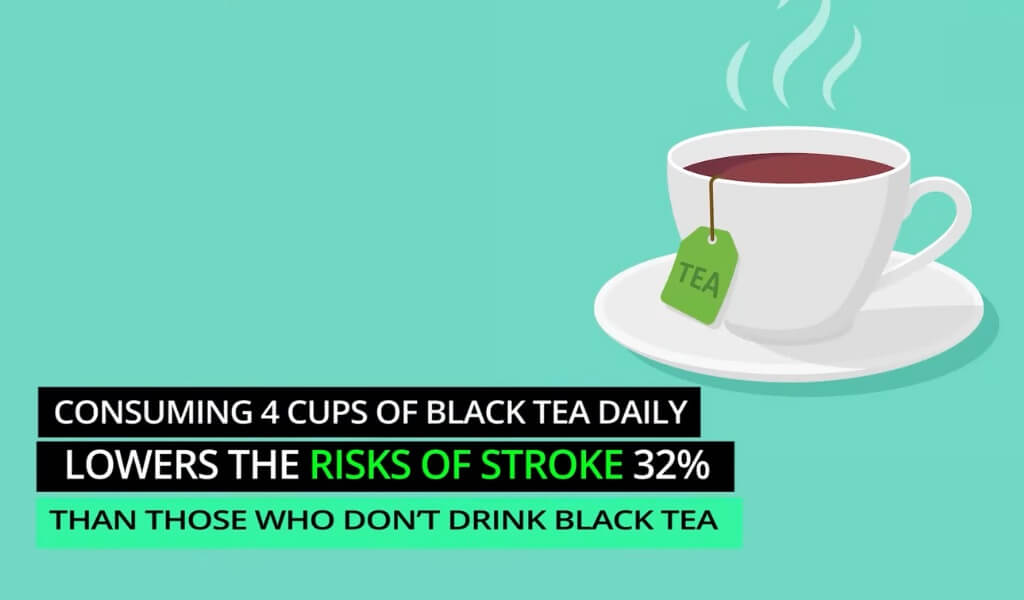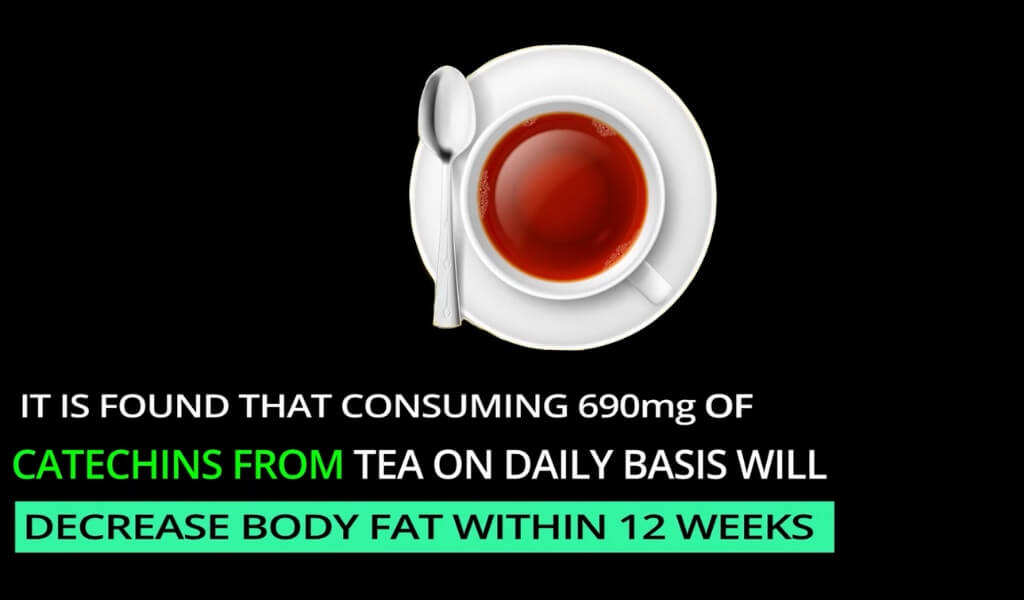As a seasoned tea enthusiast and researcher, I can confidently affirm the Benefits of Black Tea are as robust as its flavor.
I’m eager to share the depth of health perks of your humble black tea. From heart health to cognitive support, we’ll dive into the research that makes this brew more than a comforting beverage.
Quotes of tea with You
“If you are cold, tea will warm you;
if you are too heated, it will cool you;If you are depressed, it will cheer you;
If you are excited, it will calm you.”
– William Ewart Gladstone
Black Tea Nutrition Facts
I’ve always been fascinated by the remarkable complexity of black tea’s nutritional profile. This humble brew is a treasure trove of health-boosting compounds.
Key nutrients and compounds found in black tea
- Polyphenols: including flavonoids like theaflavins and thearubigins.
- Amino acids: L-theanine, known for promoting relaxation and better focus.
- Caffeine: in a modest amount, providing a morning energy boost.
- Minerals: potassium, magnesium, and calcium, contributing to its health-promoting properties.
Differences in nutrient profile depending on preparation method
Interestingly, how you prepare your black tea can influence its nutrient profile.
For example, brewing time plays a significant role. A longer steep tends to extract more of those beneficial polyphenols and caffeine.
Moreover, adding milk may affect the absorption of certain antioxidants, while a squeeze of lemon can enhance the tea’s antioxidant capacity.
Black tea benefits
So, the question is, what are the benefits of black tea? Here is the detailed answer for you to consider:
| Benefit | Description | |
| Quick view | Improved Focus | L-theanine and caffeine enhance alertness and focus. |
| Quick view | Antioxidant Properties | Polyphenols act as antioxidants, promoting health. |
| Quick view | Blood Sugar Regulation | Black tea may help manage postprandial glucose levels. |
| Quick view | Heart Health | Flavonoids in black tea may reduce LDL cholesterol. |
| Quick view | Gut Health | Polyphenols and antimicrobial properties support gut health. |
| Quick view | Stroke Reduction | Regular black tea consumption may lower stroke risk. |
| Quick view | Lung Function | Caffeine in black tea can enhance lung function. |
| Quick view | Bone Health | Black tea may improve bone density and reduce osteoporosis risk. |
| Quick view | Weight Management | Polyphenols in black tea may aid weight loss. |
| Quick view | Immune System Boost | Antioxidants in black tea may enhance the immune system. |
| Quick view | Kidney Stone Prevention | Low oxalate levels in black tea may reduce kidney stone risk. |
| Quick view | Asthma Symptom Relief | Caffeine and flavonoids in black tea might alleviate asthma symptoms. |
| Quick view | Oral Health | Antibacterial properties in black tea promote oral health. |
| Quick view | Skin Health | Polyphenols and tannins in black tea contribute to skin health. |
| Quick view | Cancer Prevention | Black tea’s antioxidants may slow cancer cell growth. |
| Quick view | Eye Health | Antioxidants in black tea could benefit eye health. |
| Quick view | Digestive Health | Black tea’s polyphenols may support digestion. |
| Quick view | Mental Health | L-theanine in black tea may have calming effects on mental well-being. |
| Quick view | Diabetes Management | Black tea might help improve insulin sensitivity. |
| Quick view | Hydration | Black tea contributes to daily fluid intake for hydration. |
1. Is black tea good for you to focus?
Your secret weapon for increased attention may be black tea. Caffeine and the unique amino acid L-theanine are both present. This amino acid increases alpha activity in the brain, which sharpens your focus and increases alertness.
The best black tea is not just a cozy beverage; it contains caffeine and a special amino acid called L-theanine that can give your alertness and focus a little nudge in the right direction.
L-theanine is a superstar; it boosts alpha activity in your brain, leading to a sense of relaxation and, you guessed it, better focus.
Because of the way L-theanine affects the brain, research demonstrates that beverages with both of these ingredients help you focus.
This might explain why many folks say they feel a steadier stream of energy after a cup of tea compared to other caffeinated drinks like coffee.
One small study looked deeper into how black tea might affect cognitive performance. Participants were given either 250ml of black tea or water, then put through their paces with tests on executive function, sustained attention, memory, and even math calculations.
The result? Those who sipped on the black tea outperformed the water drinkers, tackling cognitive tasks more quickly, showing improved memory, and making fewer mistakes.
The researchers concluded that even a modest amount of black tea can boost your cognitive processing.
Readmore:
- Now, the question is, does black tea have caffeine?
- Best time to drink black tea: Some Facts I Tested
- Let’s check out what is black tea?
- what does black tea taste like?
- Popular types of black tea include Assam, Darjeeling, and Earl Grey.
2. Has antioxidant properties
Black tea is packed with a special group of polyphenols that act as antioxidants. By including antioxidants in your diet, you might lower your risk of chronic diseases and give your general health a nice little boost.
Antioxidants are our secret health buddies. They’re all about keeping our bodies in tip-top shape.
When we eat foods rich in antioxidants, we hire a cleanup crew for our cells. They help to sweep away the damaging free radicals, reducing cell damage in our bodies. This could lower our chances of getting stuck with chronic illnesses.
Here’s where polyphenols enter the picture. They are a particular type of antioxidant that may be discovered in several delicious foods and beverages, such as black tea.
Black tea contains three key types of polyphenols: Catechins, Theaflavins, and Thearubigins, which serve as potent antioxidants with potential health benefits. In a rat study investigating the impact of black tea flavonoids on conditions like diabetes, obesity, and high cholesterol, these polyphenols were found to significantly lower blood sugar and cholesterol levels.
Another earlier study looked at catechins from oolong tea and their impact on body weight. It turned out that folks who drank enough tea to get 690 mg of catechins each day for 12 weeks saw reduced body fat. Pretty cool, right?
3. May lower blood sugar levels
Insulin is like the body’s sugar manager – it gets released when you eat something sweet. Now here’s where black tea steps in. It’s a wonderful drink option without added sugars that could help your body better use insulin and control your blood sugar levels.
High blood sugar levels can be a real party pooper. They might boost your risk of not-so-fun health issues like type 2 diabetes, obesity, heart disease, kidney failure, and even depression.
Chowing down on lots of sugar, especially from sugary drinks, can increase your blood sugar levels and risk of type 2 diabetes.
In a nutshell, when you consume sugar, your pancreas releases insulin, which acts as a VIP ticket for sugar to enter your cells and be stored as energy (glycogen). Later, when your body requires energy, glucagon steps in, breaking down glycogen to provide it. However, if you consume more sugar than your body can store as glycogen, the surplus is stashed away as fat. Not a great outcome, is it?
Now, here’s where black tea recipe comes in. Research hints that sipping on black tea might help keep your blood sugar levels in check after you eat or snack – this is called postprandial glucose.
In one well-run, small study, researchers gave 24 people (some with pre-diabetes and some without) a sugary drink and either a small or large dose of black tea or a placebo. The result? Those who had the black tea saw a significant drop in their blood sugar levels after eating compared to those who had the placebo.
Other studies suggest black tea might even help your body use insulin better.
In another small study, researchers examined how black tea affected the insulin response in overweight men with insulin resistance. The participants were given 75g of glucose and 100 ml of black tea, beetroot juice, or water. The ones who had the black tea saw their insulin response drop by about 29% compared to those who had water.
This suggests that enjoying black tea could help improve insulin sensitivity, especially after a high-sugar meal or snack.
Just a quick tip if you’re buying black tea, especially if it’s pre-made: check the label! Some brands sneak in added sugars like sucrose or high fructose corn syrup. So, keep an eye out for teas that are labeled as non-sweetened.
4. Is black tea good for LDL cholesterol?
LDL and HDL are like the transporters in our body, carrying cholesterol to and from our cells. Too much LDL, often known as the “bad” cholesterol, can increase your heart disease and stroke risk. Some research suggests black tea might lend a hand in reducing LDL levels, but keep in mind the evidence isn’t completely clear-cut.
Our bodies have these two little delivery trucks called lipoproteins that zip around carrying cholesterol wherever needed.
One is called low-density lipoprotein (LDL), and the other is high-density lipoprotein (HDL).
Consider LDL as the troublesome courier, delivering cholesterol to cells throughout your body. In contrast, HDL plays the hero’s role, retrieving cholesterol from cells and transporting it back to the liver for removal from the bloodstream.
However, excessive LDL can result in severe artery congestion. It accumulates and creates waxy deposits called plaques, posing significant risks such as heart failure or stroke.
On the bright side, some studies suggest that sipping tea might help keep those LDL levels in check.
One review of well-conducted studies found that folks who drank black tea saw their LDL cholesterol drop by a significant 4.64mg/dL. This was even more noticeable in people at a higher risk of heart issues.
That said, not all studies agree. Another well-run study found that drinking five cups of black tea daily didn’t change total HDL or LDL cholesterol levels in people with borderline-high cholesterol compared to a placebo. So, while tea can be a delicious part of a heart-healthy diet, it’s not a magic bullet.
5. Is black tea healthy for gut health?
A large portion of your immune system is located in the gut, which is like a busy metropolis and home to billions of microorganisms. Black tea’s polyphenols and antibacterial components can help your body’s natural defenses and intestinal health.
Did you know that the bacteria partying it up in your gut can greatly affect your health? Yup, you read that right.
You see, our guts are like a bustling city full of different bacteria. Some of these are friendly locals that help keep us healthy, while others… well, let’s just say they’re not so friendly.
Numerous studies have suggested that the kind of bacteria in your stomach may help reduce your chance of developing certain health problems. Consider cancer, type 2 diabetes, heart disease, obesity, and inflammatory bowel disease.
Now, let’s circle back to black tea. Remember those polyphenols we talked about?
By promoting the growth of the beneficial bacteria and controlling the harmful ones, they may contribute to the balance of your gut ecosystem.
Using its antibacterial properties to flush out unwanted particles, black tea may also perform the heroics of a gut superhero. By mending the lining of your digestive tract, it strengthens the microorganisms in your stomach and your immune system.
But, just a heads up – we still need more research about black tea’s role in immune function. So, while a cuppa could be a good part of a balanced diet, it’s not a surefire solution.
6. Black tea health benefits for hearts
Black tea is brimming with heart-friendly flavonoids. Research shows that making black tea a regular part of your daily routine might just be a step in the right direction towards reducing your risk of heart disease.
Black tea isn’t just a comforting brew; it’s also packed with a special group of antioxidants known as flavonoids. These tiny superheroes have a knack for boosting heart health.
And guess what? You can also find flavonoids in vegetables, fruits, red wine, and dark chocolate. So go on, treat yourself!
Eating foods rich in flavonoids regularly can greatly enhance your heart health. These foods can help combat various heart-detrimental factors like obesity, high triglyceride levels, hypertension, and elevated cholesterol.
Based on extensive research findings, having a daily cup of tea can reduce your risk of heart disease-related death by 4%, heart attacks and related issues by 2%, strokes by 4%, and overall mortality by 1.5%. Remarkable, isn’t it?
And there’s more. Another major study discovered that people who enjoyed tea every day had an 8% lower risk of heart disease and a 10% lower risk of major heart events, like heart attacks, than those who hadn’t had tea in the past year.
So, why not make black tea a part of your daily habits? It’s a simple and delicious way to pack more antioxidants into your diet, and it could even help you dodge future health problems.
7. Is hot black tea good for you with stroke reductions?
Black tea is highly beneficial for the heart. Theaflavins in black tea reduce blood cholesterol, while flavonoids, also present in red wine, dark chocolate, and nuts, decrease the risk of heart disease by 8%.
Stroke sadly holds the title of the second top cause of death worldwide. But there’s a silver lining – many strokes can be prevented. Research has found that our friend, black tea, might have a role in helping to lower the chances of a stroke.
A stroke happens when a blood vessel in your brain gets blocked or bursts. It’s a big deal – it’s the second most common cause of death worldwide.
The good news is that 80% of strokes may be prevented before they occur. You may do this by keeping an eye on your food, working out frequently, controlling your blood pressure, and quitting smoking, among other things.
Here’s when things start to become pretty intriguing. According to several research, a regular cup of black tea might also be your body’s best defense against strokes.
Researchers looked at the relationship between consuming tea or coffee and the risk of stroke, dementia, and dementia after a stroke in one significant study with 365,682 individuals.
After tracking participants for over 11 years, they discovered that those who enjoyed at least two cups of tea per day had a 16% lower risk of a type of stroke called ischemic stroke, compared to those who didn’t drink tea.
Another study took a different approach. It used genetic factors linked to tea consumption to explore the relationship between sipping tea and stroke risk.
What they found was pretty cool: if your genes make you more likely to enjoy more cups of tea daily, you also have a lower risk of stroke. So, go ahead and pour yourself another cuppa – it could be doing you more good than you think!
8. Is black tea good for your lungs?
According to researchers, caffeine in black and green teas can slightly enhance lung function. Patients often assert that herbal teas such as ginger and licorice have a positive impact.
Black tea is packed with polyphenols, which might be handy in battling cancer cells within your body. Remember, though, that black tea isn’t a magic potion to cure cancer, it might help slow down the growth of cancer cells and lessen the risk of some types of cancer.
There are over 100 different types of cancer out there, and unfortunately, not all of them can be prevented.
But here’s a spot of good news: the polyphenols – an antioxidant – found in your cup of black tea might help slow down the growth of certain types of cancer and even encourage cancer cells to call it quits.
One thorough review of studies on tea’s effects on cancer risk found that tea drinkers seem to have a lower risk of oral cancer.
The authors of this review suggested that tea might also be linked to a lower risk of other cancers, including those of the digestive tract, breasts, ovaries, lungs, and thyroid. However, we need more carefully planned studies to know for sure.
Another review focused on how drinking green and black tea might impact the risk of endometrial cancer.
The study revealed that those who drank the most green tea had a 22% lower risk of endometrial cancer. Plus, every additional daily cup of green tea was linked to an 11% lower risk of developing this type of cancer.
But when it came to black tea, there wasn’t a significant link between its consumption and the risk of endometrial cancer.
While black tea certainly shouldn’t be seen as an alternative cancer treatment, some research suggests it could help reduce the risk of certain types of cancers.
Still, we need more human studies to better understand how black tea might interact with cancer cells. So, stay tuned!
9. Does black tea lower blood pressure
A recent study examined the impact of black tea on blood pressure and discovered that consuming black tea led to a significant decrease in both systolic and diastolic blood pressure compared to the control group. The effects were particularly noticeable in men and individuals who consumed black tea for more than seven days.
High blood pressure can be a troublemaker, leading to several health issues. But don’t worry, sipping on black tea regularly might help keep your systolic and diastolic blood pressure numbers in check.
High blood pressure is a tricky customer. It can up your chances of nasty stuff like heart and kidney failure, stroke, vision loss, and heart attacks. But hey, don’t worry! Some tweaks to your diet and lifestyle can help decrease your blood pressure.
A review of well-conducted studies checked out how drinking tea might affect folks with high blood pressure, also known as hypertension.
Regular tea drinkers experienced a noteworthy benefit: their systolic blood pressure (the upper number) decreased by 4.81 mm Hg, and their diastolic blood pressure (the lower number) dropped by 1.98 mm Hg. Those enjoying tea for over three months witnessed even greater reductions in these figures.
Another review focused specifically on black tea’s effects on blood pressure. It turns out, enjoying black tea regularly can significantly bring down both systolic and diastolic blood pressure compared to not having any tea. The benefits were even more noticeable for men and anyone who drank black tea for over a week.
So, adding a daily cup of black tea to your routine and other lifestyle changes like learning to manage stress could be a real boon for folks dealing with high blood pressure. It sounds like a good excuse for a tea break to me!
10. Easy to make
Not only is black tea a powerhouse of health benefits, but it’s also super easy to whip up.
When I make black tea, I start by bringing some water to a boil. If I use store-bought tea bags, I just pop a tea bag into my favorite mug and pour in the hot water.
If I feel like using loose leaf tea, I measure 2–3 grams of tea leaves for every six ounces of water and put them in a tea strainer.
Next, I let the tea steep in the water for about 3–5 minutes – you can adjust this depending on how strong you like your tea. If you’re in the mood for a more robust brew, just add more tea leaves and let it steep a bit longer.
Once the tea has steeped, I remove the tea leaves or tea bag from the water. Now comes the best part – sitting back and enjoying my homemade black tea!
11. What does black tea help with energizing
If you’re like me, constantly juggling a never-ending list of tasks and trying to squeeze in some much-needed workouts, let me introduce you to black tea – our potential secret ally. According to a study by the University of Maryland Medical Center, black tea contains more caffeine than most other teas, yet only about half as much as coffee. This makes it the perfect choice for those seeking a moderate energy lift without the dreaded crash later.
I’ve found that black tea provides a calmer, more sustainable energy boost, unlike coffee which can sometimes leave me feeling jittery. So, if you want to replace that coffee with something less intense, you might just find your sweet spot with a warm cup of black tea.
What makes black tea even more interesting is its additional component – theophylline. As noted by the National Institutes of Health, Theophylline is a mild stimulant that can slightly increase your heart rate. Working in harmony with caffeine, it helps me stay alert, focused, and ready to tackle my day head-on.
So, the next time I need an energy boost to conquer a gym session, whip up a meal, or simply step outside for fresh air, I reach out for my cup of black tea. This energy-packed tea doesn’t just help me meet my goals; it almost makes them feel like a breeze. Let’s harness the power of black tea and turn our endless to-do list into a list of accomplishments.
As I sipped my black tea, it was not just my internal health getting a beneficial boost. Remarkably, black tea also enhances my outer glow, lending a radiance to my skin and a shine to my hair.
Packed with potent antioxidants, tannins, and polyphenols, black tea has been shown to promote rapid skin healing, reduce puffiness, and even help eliminate skin blemishes. According to a National Institutes of Health study, certain Chinese black teas are believed to foster hair growth. And there’s more – black tea’s calming properties help curb stress and anxiety, resulting in an even brighter complexion and glossy, gorgeous hair.
But the benefits of black tea don’t stop at mere vibrancy. This humble beverage has been linked to reducing visible signs of aging, such as wrinkles. Its detoxifying qualities and its antioxidant properties wage war against free radicals, combating cellular damage.
So, the next time I’m feeling worn out, looking a bit lackluster, or simply need to perk up before a big day, I know what I’ll be reaching for – a soothing cup of black tea. Its benefits reach beyond mere refreshment, offering a holistic approach to well-being, both inside and out.
12. Improves Hair And Skin
As I sipped my black tea, it was not just my internal health getting a beneficial boost. Remarkably, black tea also enhances my outer glow, lending a radiance to my skin and a shine to my hair.
Packed with potent antioxidants, tannins, and polyphenols, black tea has been shown to promote rapid skin healing, reduce puffiness, and even help eliminate skin blemishes. According to a National Institutes of Health study, certain Chinese black teas are believed to foster hair growth. And there’s more – black tea’s calming properties help curb stress and anxiety, resulting in an even brighter complexion and glossy, gorgeous hair.
But the benefits of black tea don’t stop at mere vibrancy. This humble beverage has been linked to reducing visible signs of aging, such as wrinkles. Its detoxifying qualities and antioxidant properties wage war against free radicals, combating cellular damage.
So, the next time I’m feeling worn out, looking a bit lackluster, or simply need to perk up before a big day, I know what I’ll be reaching for – a soothing cup of black tea. Its benefits reach beyond mere refreshment, offering a holistic approach to well-being, both inside and out.
13. Is black tea bad for your immunity?
A recent study suggests that consuming two or more cups of black tea daily can reduce the risk of death from any cause by nearly 13% compared to those who don’t drink tea. The study also found that the more tea participants consumed, the lower their risk of cardiovascular disease, heart disease, and stroke.
These free radicals are notorious for meddling with DNA and disrupting normal cell function, triggering inflammation and putting our bodies in a stressful state. But that’s where my friend, black tea, comes to the rescue.
Sipping on black tea helps cleanse my body of these pesky oxygen radicals, effectively bolstering my immune system’s function. In essence, it aids in restoring the normal functioning of my cells and body while also strongly boosting my immunity. So, it’s a comforting drink and a healthy ally, quietly working to keep me in optimal health.
14. May Improve Bone Health
As we grow older, it’s natural for our bones to lose their strength. Yet, scientific observations have shown that people like myself who regularly drink black tea can significantly improve their bone density. A study by the National Institutes of Health found that black tea consumption could potentially reduce the risk of fractures commonly associated with osteoporosis in older individuals.
Their bone density was increased when black tea extracts were administered to rats. This is a compelling reason to include black tea in our diets, especially as we hit our thirties – a time when maintaining bone density becomes crucial.
By enjoying a cup of black tea regularly, we’re safeguarding against osteoporosis and the associated risk of fractures and potentially reducing the risk of hip fractures. Tea, in general, has been linked to this positive effect. So, let’s drink to our health with a warm, soothing cup of black tea.
15. May Reduce Parkinson’s Risk
Parkinson’s is a neurodegenerative disease that primarily affects the older population. However, research indicates that the polyphenols found in black tea might offer a protective shield for our brains.
In a study I came across conducted by the National University of Singapore, the scientists discovered an intriguing connection. They found that the caffeine present in black tea was inversely linked to Parkinson’s disease. In simpler terms, higher consumption of black tea – and therefore its caffeine content – was associated with a lower risk of developing this disease.
As someone with experience and expertise in this field, this correlation is fascinating and promising. It underscores the potential benefits of incorporating black tea into our diets for immediate health perks and long-term neurological protection.
16. May Aid Weight Loss
Obesity can often be a root cause of various health conditions like diabetes, heart disease, PCOS, and high cholesterol. Just as we acknowledge the role of green tea in weight management, black tea too may play a part when combined with appropriate lifestyle changes.
In a study conducted by scientists from the David Geffen School of Medicine in California, USA, it was discovered that black tea helped reduce visceral fat by dialing down the activity of genes that trigger inflammation. I find this particularly interesting as someone who delves into these issues because prolonged inflammation can lead to obesity. Therefore, sipping black tea could theoretically help prevent obesity induced by chronic inflammation.
Additionally, black tea might also play a role in lowering triglyceride levels, contributing further to its potential weight management benefits. With all these potential health perks, it seems another good reason to enjoy a comforting cup of black tea.
17. May Reduce The Risk Of Kidney Stones
Kidney stones are not only painful but also quite common. An elevated excretion of substances like oxalate, calcium, and uric acid from the body typically causes them. Interestingly, black tea has considerably lower oxalate levels than other herbal teas.
While some anecdotal evidence suggests that black tea might reduce the risk of kidney stones, it’s important to note that comprehensive research on this matter is yet to be conducted. As someone with experience and expertise in this field, I’d always advise consulting with a healthcare professional before using black tea or any dietary changes to manage health conditions like kidney stones.
In the end, while black tea is a delightful beverage with numerous potential health benefits, it’s essential to remember that it’s not a standalone cure and should be consumed as part of a balanced lifestyle
18. May Relieve Asthma Symptoms
Asthma occurs due to inflammation and swelling in the airways or bronchial tubes, making breathing challenging. Anecdotal accounts indicate that sipping on black or green tea could alleviate asthma symptoms.
In fact, some studies, including one I came across from the American Journal of Respiratory and Critical Care Medicine, have demonstrated that the caffeine found in teas might assist in improving lung function. Moreover, the flavonoids in tea were also discovered to be beneficial for individuals suffering from asthma.
As an expert in this field, I find these correlations promising. Nevertheless, it’s vital to remember that while black tea can be a comforting and potentially helpful dietary addition, it should complement, not substitute for, prescribed asthma treatments.
19. Is black tea anti-inflammatory at oral?
In her great review, she highlighted the health benefits of black tea. With its abundance of antioxidants and other compounds, black tea has the potential to lower inflammation and decrease the risk of chronic illnesses.
Enjoying black tea might protect against dental woes such as plaque, cavities, and tooth decay. Plus, it might even freshen up your breath. With its antibacterial and antioxidant properties, black tea can help ward off infections caused by staphylococcus bacteria. The fluoride content in black tea also plays a role in preventing dental caries.
Moreover, some studies have indicated that black tea could potentially help avert oral leukoplakia in patients with oral carcinoma, pointing towards its role in improving dental health.
However, there’s a little catch. As someone with expertise in this field, I’d advise you to remember that black tea may cause staining on the tooth enamel. So, it’s always a good idea to consult your dentist.
While black tea can be a delightful and potentially beneficial addition to your routine, it’s always best to pair it with proper dental care practice.
20. Benefits Of Black Tea For Skin
Black tea could be a hidden gem for enhancing skin health. It’s said to battle skin infections and blemishes, slow aging, and even lessen eye puffiness. The secret lies in its rich content of polyphenols and tannins, which are linked to the rejuvenation of skin cells.
However, as someone with expertise in this area, I’d always suggest consulting with a dermatologist before using black tea for skin care. Even though it’s a natural ingredient, ensuring it suits your specific skin type and needs is essential.
So, next time you enjoy a warm cup of black tea, remember it’s not just a delightful beverage; it could also contribute to your radiant skin.
Black Tea Side Effects
As with most things in life, moderation is key, and consuming too much black tea might affect your health in several ways. Let’s look at some potential side effects of overindulging in black tea.
| Black Tea Side Effects | Reason |
| Diarrhea |
The caffeine in black tea can stimulate your digestive system, and too much of it may lead to diarrhea.
|
| Constipatio |
On the flip side, black tea could potentially cause constipation. The tannins in black tea might be the culprits, but more research is needed to confirm this.
|
| Anxiety |
Drinking excessive amounts of black tea can cause anxiety and rapid breathing, likely due to the caffeine content. This stimulant can also affect the nervous system, potentially leading to insomnia and restlessness.
|
| Frequent Urination |
Caffeine can make your bladder overactive, making you need to visit the restroom more often than usual.
|
| Increased Risk of Seizures |
The caffeine in black tea might heighten the risk of seizures and reduce the effectiveness of medications used to prevent them.
|
| Glaucoma |
Caffeine is known to increase pressure inside the eye. Some anecdotal evidence suggests that this pressure spike might occur within 30 minutes and last up to 90 minutes after drinking black tea.
|
If you have vision issues, it’s best to consult an ophthalmologist before enjoying black tea.
Remember, it’s all about striking a balance. Enjoying black tea in moderation can provide numerous health benefits, but overdoing it can lead to unwanted side effects. So, responsibly savor your cup of black tea and listen to your body’s needs.
Recommended Consumption
While it varies depending on factors like your tolerance to caffeine, a general guideline is 1 to 2 cups of black tea per day. This amount seems sufficient for enjoying its benefits without causing most people to exceed the recommended daily limit for caffeine.
Considerations for different populations (pregnant women, people with certain medical conditions, etc.)
[References: Multiple scientific journals and medical studies, including those published on PubMed and other health-related databases]
In conclusion
The benefits of black tea are truly impressive, aren’t they? From boosting heart health to enhancing mental well-being, the power of this humble brew shouldn’t be underestimated. I encourage you to share this information with your tea-loving friends and family. After all, who wouldn’t want to enjoy a delicious cup of black tea, knowing it’s doing so much good? Keep sipping and stay healthy, my friends!
Thanks for spiriteadrinks.com
FAQs
What does black tea do for your body?
Black tea boosts heart health, improves mental alertness, and strengthens your immune system due to its rich antioxidants and modest caffeine content. It’s a beneficial addition to a balanced diet.
Is drinking black tea better than water?
Black tea offers health benefits like antioxidants, but it doesn’t replace the essential hydration provided by regular water intake.
Is black tea safer than coffee?
Black tea is generally considered safer than coffee due to its lower caffeine content, reducing potential side effects like jitters, insomnia, and rapid heart rate. However, individual tolerance varies.
Does black tea suppress appetite?
Black tea’s diuretic properties make it a great companion for achieving a flat stomach. Consuming between meals acts as an appetite suppressant, preventing unnecessary snacking and aiding in weight loss. Additionally, black tea is low in calories and sodium, making it suitable for daily consumption.
How does black tea affect heart health?
Black tea can positively impact heart health by reducing the risk of heart disease due to its antioxidant properties and ability to improve cholesterol levels.
Can black tea improve mental health?
Black tea can contribute to improved mental health as it contains compounds like L-theanine that promote relaxation and may help reduce stress and anxiety.
Does black tea strengthen the immune system?
Black tea may strengthen the immune system through its rich polyphenol content, which can support the body’s defense mechanisms against infections.
Are there specific diseases that black tea can help prevent?
Black tea has shown potential in preventing various diseases, including diabetes and certain types of cancer, thanks to its powerful antioxidants and health-promoting properties.
I’m Shanna, creator of Spiritea Drinks. I’m all about teaching people to grow their own food, tea, cook what they harvest, and eat with the seasons.










